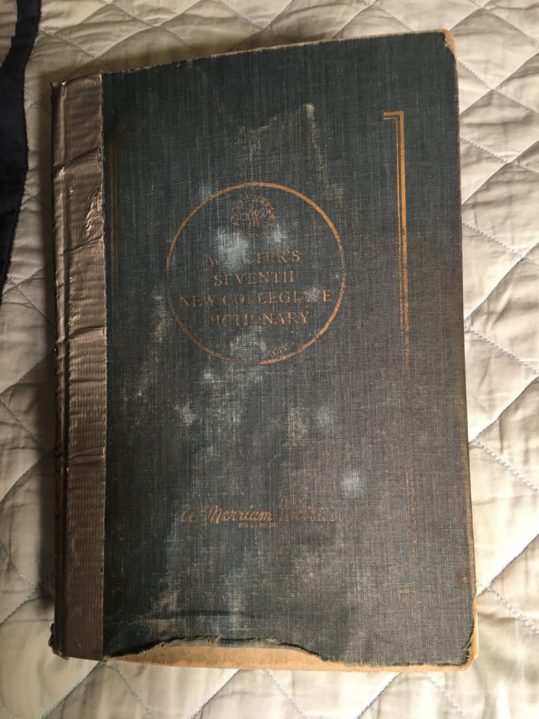Tags
Americanisms, Charlton Laird, David P. Stang, Etymology, James Boswell, Language and the Dictionary, Lexicographic Gratification, Lexicography, Mitford M. Mathews, Samuel Johnson, Thomas Jefferson, Webster's Collegiate Dictionary, William E. Umbach

(Ed. note: My friend Dave chose to entitle this essay ‘Lexicographic Gratification’ and somewhat reluctantly agreed to my adding ‘Confessions of an Introvert’ to his title. I think he prefers to think of himself as an ambivert.)
By David Stang
Fred Scharf, the husband of my second cousin Anne Phillips and the only lawyer and intellectual in my whole extended family, gave me a Webster’s Collegiate Dictionary bearing the same copyright date, 1957, as my graduation from high school. Bookish Uncle Fred told me to “treasure it by reading its definitions for the pure pleasure of learning new words, including synonyms, antonyms and etymology – meaning the study of word origins. Besides that,” he said, “you’ll find tons of amazing information up front before the dictionary section begins and at the end after the last word beginning with the letter Z.”
This was an entirely new way of viewing dictionaries, in fact, nearly the opposite of how I felt about them, particularly, when as a schoolboy, I would ask my mother what is the meaning of ‘X word’? And she would say,”Go look it up and that way you’ll remember it better than if I tell you.” I would usually answer her by saying, “Mom, it’s a complete waste of time to go look it up in the dictionary when you already know the answer and can tell me now.” Sometimes I could browbeat her into giving me the answer, but usually she sternly pointed to the big unabridged dictionary resting atop its own four foot high podium. As soon as she would walk out of the room, I would whisper to myself, “The hell with it. I’m not looking it up.”
But that night back in 1957 I sat on the edge of my bed near the reading lamp, opened my new dictionary and discovered that Uncle Fred was right. There was an amazing amount of essays and commentary on the history of lexicography, etymology, the beauty and depth of the English language, and on and on. And at the back of the dictionary there were tables of all kinds: names and addresses of all the colleges and universities in the United States and Canada, symbols, abbreviations, proper forms of address, and a load of other miscellaneous information. I said to myself, “Maybe Uncle Fred is right. I ought to start reading this stuff. Maybe I should become a word junkie.” But would I ever really be able to convince myself that looking up words in the dictionary is more fun than a barrel of monkeys?
Anyway, I started to read the first article in my new dictionary which was about the history of the English language and the history of lexicography. I got about as far as the author’s discourse on the linguistic influence on the English language contributed by the Angles, Jutes and Saxons. In less than a minute I concluded that ‘All this crap is complicated and boring. I’m not going to waste another minute reading it.’ Then I reflected for a moment and realized I would seriously need this dictionary when I started college at the end of the summer because if I were doing some kind of course assignment and spotted a word I didn’t know I’d be better off looking it up than faking it.
While studying to earn my B.A., J.D. and M.T.S. degrees, I relied upon that dictionary quite a bit. Even more so years later when I was reading for pleasure and didn’t know the meaning of a word or when I was researching and writing a number of articles and a few books. By my recent off the cuff estimate, I must have used that dictionary at least 25,000 times. But rarely – in fact never – did I dare take the time to wallow extensively in all that good stuff printed before and after the dictionary part of the book.

